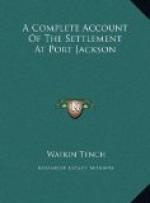A single egg, the production of a cassowary, was picked up in a desert place, dropped on the sand, without covering or protection of any kind. Its form was nearly a perfect ellipsis; and the colour of the shell a dark green, full of little indents on its surface. It measured eleven inches and a half in circumference, five inches and a quarter in height, and weighed a pound and a quarter. Afterwards we had the good fortune to take a nest. It was found by a soldier in a sequestered solitary situation, made in a patch of lofty fern about three feet in diameter, rather of an oblong shape and composed of dry leaves and tops of fern stalks, very inartificially put together. The hollow in which lay the eggs, twelve in number, seemed made solely by the pressure of the bird. The eggs were regularly placed in the following position.
O O O O O O O O O O O O
The soldier, instead of greedily plundering his prize, communicated the discovery to an officer, who immediately set out for the spot. When they had arrived there they continued for a long time to search in vain for their object, and the soldier was just about to be stigmatized with ignorance, credulity or imposture, when suddenly up started the old bird and the treasure was found at their feet.
The food of the cassowary is either grass, or a yellow bell-flower growing in the swamps. It deserves remark, that the natives deny the cassowary to be a bird, because it does not fly.
Of other birds the varieties are very numerous. Of the parrot tribe alone I could, while I am writing, count up from memory fourteen different sorts. Hawks are very numerous, so are quails. A single snipe has been shot. Ducks, geese and other aquatic birds are often seen in large flocks, but are universally so shy, that it is found difficult to shoot them. Some of the smaller birds are very beautiful, but they are not remarkable for either sweetness, or variety of notes. To one of them, not bigger than a tomtit, we have given the name of coach-whip, from its note exactly resembling the smack of a whip. The country, I am of opinion, would abound with birds did not the natives, by perpetually setting fire to the grass and bushes, destroy the greater part of the nests; a cause which also contributes to render small quadrupeds scarce. They are besides ravenously fond of eggs and eat them wherever they find them. They call the roe of a fish and a bird’s egg by one name.
So much has been said of the abundance in which fish are found in the harbours of New South Wales that it looks like detraction to oppose a contradiction. Some share of knowledge may, however, be supposed to belong to experience. Many a night have I toiled (in the times of distress) on the public service, from four o’clock in the afternoon until eight o’clock next morning, hauling the seine in every part of the harbour of Port Jackson: and after a circuit of many miles and between twenty and thirty hauls, seldom more than a hundred pounds of fish were taken. However, it sometimes happens that a glut enters the harbour, and for a few days they sufficiently abound. But the universal voice of all professed fishermen is that they never fished in a country where success was so precarious and uncertain.




